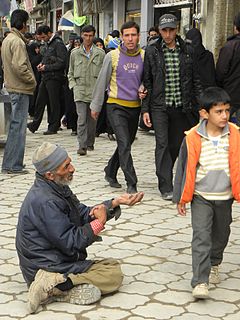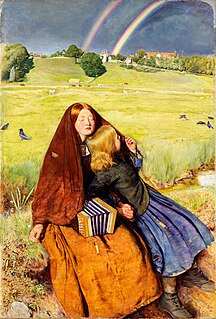
Homelessness in Canada has grown in hugeness and complexity since 1997. While historically known as a crisis only of urban centres such as Montreal, Laval, Vancouver, Edmonton, Calgary, and Toronto, increasing homelessness in suburban communities requires new services and resources.

A squeegee man or squeegee woman, squeegee kid (Canada), squeegee boy (Baltimore), squeegee punk (Montreal), squeegee merchant (London), squeegee guy or squeegee bandit is a person who, using a washcloth and squeegee, wipes windshields of cars stopped in traffic, in exchange for money.
Disorderly conduct is a crime in most jurisdictions in the United States, the People's Republic of China, and the Republic of China. Typically, "disorderly conduct" makes it a crime to be drunk in public, to "disturb the peace", or to loiter in certain areas. Many types of unruly conduct may fit the definition of disorderly conduct, as such statutes are often used as "catch-all" crimes. Police may use a disorderly conduct charge to keep the peace when people are behaving in a disruptive manner to themselves or others, but otherwise present no danger.

Begging is the practice of imploring others to grant a favor, often a gift of money, with little or no expectation of reciprocation. A person doing such is called a beggar or panhandler. Beggars may operate in public places such as transport routes, urban parks, and markets. Besides money, they may also ask for food, drinks, cigarettes or other small items.
Georges Bédard is a former member of Ottawa City Council representing the ward of Rideau-Vanier. This ward covers Lower Town, Sandy Hill, and Vanier. Born and raised in the area Bédard currently lives in Sandy Hill. He attended Carleton University, where he obtained a degree in political science. He first became involved in local politics in the successful effort to block the construction of the King Edward Expressway. He was first elected to city council at a young age in 1974 and served on the council until 1980. During this period he was best known for his efforts at preserving heritage structures. Upon leaving the council he became president of the Heritage Canada Foundation. He is also among the founders of the Franco-Ontarian Festival, and of Ottawa's Pollution Probe. He later joined the federal civil service serving as a land claims negotiator. He also had a number of other duties including serving as president of Ottawa's Tulip Festival. In the 2003 Ottawa election he returned to Ottawa's city council, replacing Madeleine Meilleur who had become a member of the provincial legislature. Meilleur endorsed Bédard's return to city council and he elected with 42% of the vote with his closest rival getting 27%.

Loitering is the act of remaining in a particular public place for a prolonged amount of time without any apparent purpose.
Sidewalk counseling, also known as sidewalk interference, is a form of anti-abortion activism conducted outside abortion clinics. Activists seek to communicate with those entering the building, or with passersby in general, in an effort to persuade them not to have an abortion or to reconsider their position on the morality of abortion. They do so by trying to engage in conversation, displaying signs, distributing literature, and/or giving directions to a nearby crisis pregnancy center.
Governments sometimes take measures designed to afford legal protection of access to abortion. Such legislation often seeks to guard facilities which provide induced abortion against obstruction, vandalism, picketing, and other actions, or to protect patients and employees of such facilities from threats and harassment.
Current laws passed by the Parliament of Canada in 2014 make it illegal to purchase or advertise sexual services and illegal to live on the material benefits from sex work. The law officially enacted criminal penalties for "Purchasing sexual services and communicating in any place for that purpose."

Vagrancy is the condition of homelessness without regular employment or income. Vagrants usually live in poverty and support themselves by begging, scavenging, petty theft, temporary work, or social security. Historically, vagrancy in Western societies was associated with petty crime, begging and lawlessness, and punishable by law with forced labor, military service, imprisonment, or confinement to dedicated labor houses.
The Ottawa Panhandlers' Union was a union for panhandlers, the homeless and others formed in Ottawa, Canada in early 2003. It was a shop of the Industrial Workers of the World (IWW), Ottawa-Outaouais General Membership Branch. The union fought systematic oppression faced by street people in Ottawa; this includes the homeless, panhandlers, buskers, and people with who are part of the street. Andrew Nellis was spokesperson for this union, roughly from 2005 until his resignation in April 2011. The next spokesperson was Karen Crossman.
Aggressive panhandling is a legal term for unlawful forms of public begging. Proponents of such legislation advocate placing limits on these activities. Some opponents lament what they perceive to be the "criminalization of homelessness" and argue that such laws are discriminatory or unevenly enforced.
The history of prostitution in Canada is based on the fact that Canada inherited its criminal laws from England. The first recorded laws dealing with prostitution were in Nova Scotia in 1759, although as early as August 19, 1675 the Sovereign Council of New France convicted Catherine Guichelin, one of the King's Daughters, with leading a "life scandalous and dishonest to the public", declared her a prostitute and banished her from the walls of Quebec City under threat of the whip. Following Canadian Confederation, the laws were consolidated in the Criminal Code. These dealt principally with pimping, procuring, operating brothels and soliciting. Most amendments to date have dealt with the latter, originally classified as a vagrancy offence, this was amended to soliciting in 1972, and communicating in 1985. Since the Charter of Rights and Freedoms became law, the constitutionality of Canada's prostitution laws have been challenged on a number of occasions.

Canada (AG) v Bedford, 2013 SCC 72, [2013] 3 SCR 1101 is a decision of the Supreme Court of Canada on the Canadian law of sex work. The applicants, Terri-Jean Bedford, Amy Lebovitch and Valerie Scott, argued that Canada's prostitution laws were unconstitutional. The Criminal Code included a number of provisions, such as outlawing public communication for the purposes of prostitution, operating a bawdy house or living off of the avails of prostitution, even though prostitution itself is legal.
Clark v. Community for Creative Non-Violence, 468 U.S. 288 (1982), is a United States Supreme Court case with the National Park Service's regulation which specifically prohibited sleeping in Lafayette Park and the National Mall at issue. The Community for Creative Non-Violence (CCNV) group had planned to hold a demonstration on the National Mall and Lafayette Park where they would erect tent cities to raise awareness of the situation of the homeless. The group obtained the correct permits for a seven-day demonstration starting on the first day of winter. The Park Service however denied the request that participants be able to sleep in the tents. The CCNV challenged this regulation on the basis that it violated their First Amendment right.
Topfreedom in Canada has largely been an attempt to combat the interpretation of indecency laws that considered a woman's breasts to be indecent, and therefore their exhibition in public an offence. In British Columbia, it is a historical issue dating back to the 1930s and the public protests against materialistic lifestyle held by the radical religious sect of the Freedomites, whose pacifist beliefs led to their exodus from Russia to Canada at the end of the 19th century. The Svobodniki became famous for their public nudity: mostly for their nude marches in public and the acts of arson committed also in the nude.
Poverty in Ontario refers to people living in Ontario deprived of or facing serious challenges in meeting basic needs such shelter, food, clothing and other essential needs. Based on relative and absolute measures, there is a significant level of poverty in Ontario.

Homelessness in Florida is considered a major social issue, mainly due to its warm weather.

Homelessness in the United States has occurred to varying degrees across the country. The total number of homeless people in the United States fluctuates and constantly changes hence a comprehensive figure encompassing the entire nation is not issued since counts from independent shelter providers and statistics managed by the United States Department of Housing and Urban Development vary greatly. Federal HUD counts hover annually at around 500,000 people. Point-in-time counts are also vague measures of homeless populations and are not a precise and definitive indicator for the total number of cases, which may differ in both directions up or down. The most recent figure for the year 2019 that was given was at 567,715 individuals across the country that have experienced homelessness at a point in time during this period.







